Interview: 'It Was the Easiest “Yes!” I've Ever Said!': Shay Barclay And Felix Hagan on Storytelling for Television in BBC's BAD EDUCATION: A CHRISTMAS CAROL
If you've got Layton Williams in your show, for God's sake, do a musical!
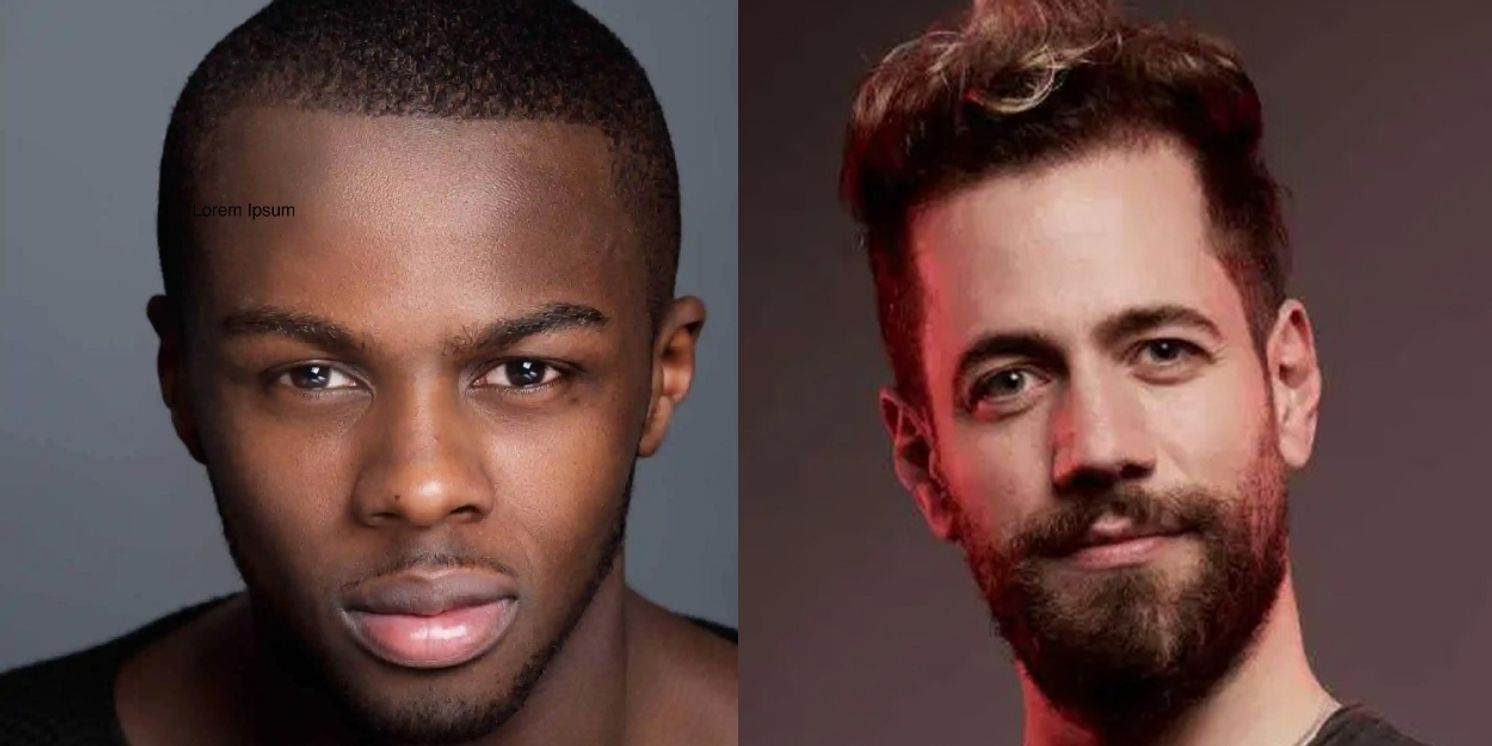
The holidays are here, which can only mean one thing - Christmas specials are arriving! Bad Education: A Christmas Carol, recently debuted on BBC Three.
Starring Layton Williams as Stephen Carmichael and including a return from the original Bad Education lead, Jack Whitehall, the musical episode takes Carmichael on a holiday adventures with the ghosts of his past, present and future as he must choose whether to leave or remain at Abbey Grove School.
BroadwayWorld had the opportunity to speak with Felix Hagan, co-writer of the multi-award winning musical Operation Mincemeat, who wrote original songs for the episode, and Shay Barclay, the programme's choreographer, who recently choreographed West-End production of The Wizard of Oz.
We discussed what made them want to be involved in the Bad Education Christmas special, what their creative process for the episode was like and what it’s like to create for the stage versus the screen.

What made you want to be involved in this Christmas special of Bad Education?
Felix: Well, I've been great friends with Freddy [Syborn], who is directing the series and directed that episode, since we were 13, so nearly ten years! We've been writing silly songs together pretty much since the day we met. I've always wanted to get involved with Bad Ed in some way or another - I absolutely love the show. Then, last year, they did the great big reboot, and now Layton Williams is leading the cast. And if you've got Layton Williams in your show, for God's sake, do a musical! The man is a supernova of talent, and to have the chance to write for him, good Lord . . . So they wanted to do a musical episode. And thank God I was pals with Freddie and I was starting to get my name out there as a composer of musical theatre thanks to a show of mine, that song of the moment. And then they asked me to come in and write some songs for an episode of the last season, and I thought it was such a funny idea! We came and wrote all these very silly things and I got to work with the cast who was so amazingly talented and so funny.
Having performers like that sing songs that you've written, it's like having a magic paintbrush - you can come up with words on the paper and think they're funny, but then you give them to a truly gifted young comedy performer and they make them truly come alive. And once that episode was done, I just couldn't wait to have another go! They came up with the idea for the Christmas episode and it was the easiest “Yes!” I've ever said.
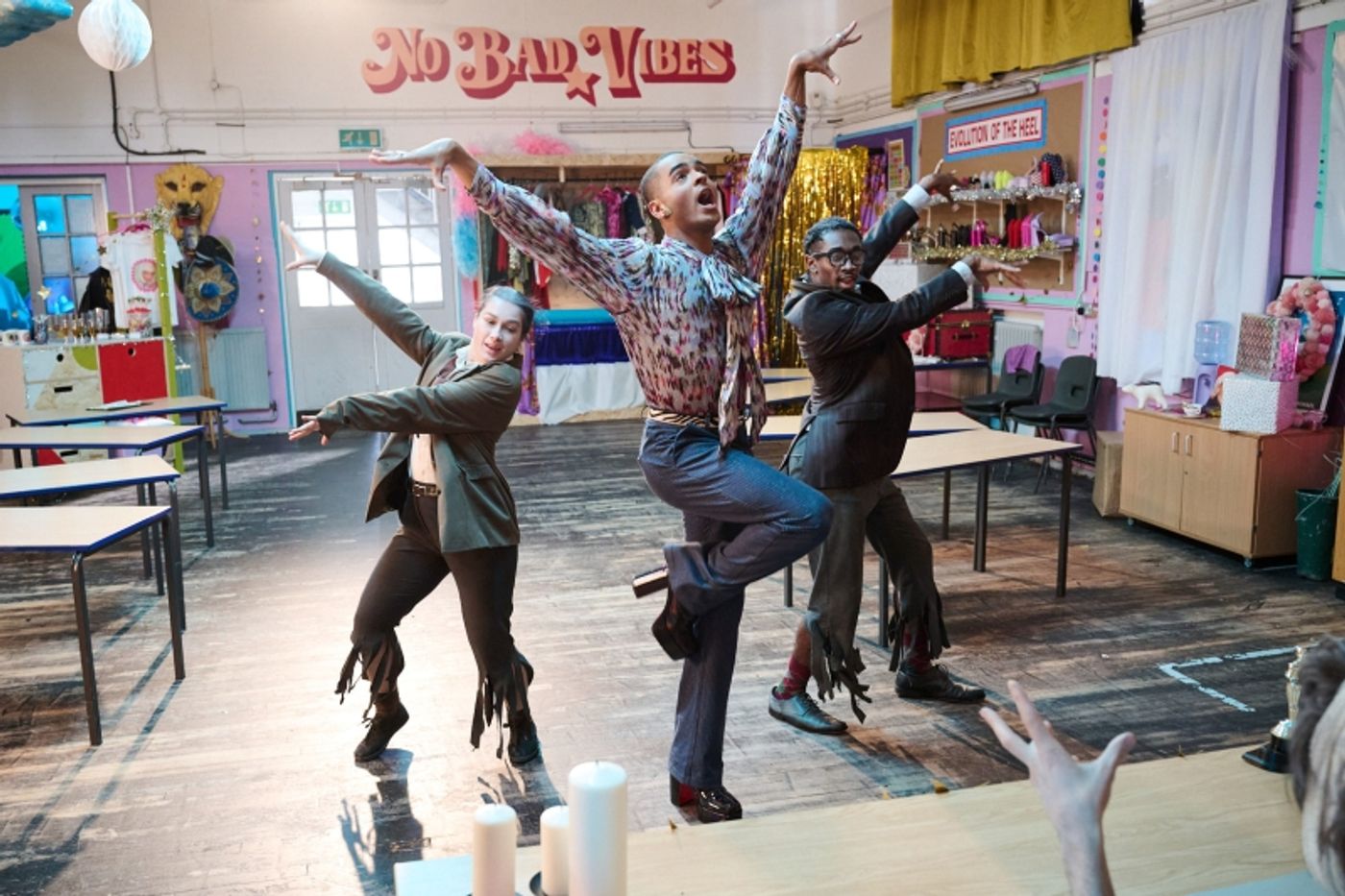
Shay: So I got brought on board from a recommendation from Layton Williams. I have been working on musicals, similar to Felix - probably not as famous and prolific as Felix's work! But I've been working on musicals, and as a performer, I did a lot of film and TV, so I've always wanted to stretch out my creative side to the TV and film industry. So when I got asked, it was an absolute pleasure, because I love the classic show - I love Bad Education! And then once I heard the music and actually got to work with Felix, it was even more of a magical moment because not everyone is as collaborative or wanting to support dance or different elements when it's created, but Felix was super supportive, very adhering to my questions and my wants and made it so much easier, so much more enjoyable. And I had a very, very great time working with him.
What was the creative process like for creating this episode for both of you?
Shay: So it was great because the director, Freddy, was great! When we first sat down and spoke about it, he explained the baseline of what he wanted to achieve story-wise and left me to it! Once I heard the music, especially for the canteen scene, there was no like, “I want them to be here and then move here and then do this.” It was very much, “I want to continue to create this feeling of Abbey Grove. I want to be interesting, but I want to have the same kind of qualities that we have in the show.” And then we just leapt into it, which was great.
I feel like it gave me the space to be creative. So creatively, I was given broad strokes - I had the music and I was allowed to think freely, so it was a really great process. And then once I actually started, it was really collaborative, because then I asked Felix for support or I’d ask him to speed something up, or ask if we could put something in the orchestration. And I’d ask Freddy, “Could shoot it in this way?” Every department had their moment to lead at certain periods of time. So the process was really joyful!
Felix: For me, like I said, Freddy and I, we've known each other since we were kids - our shorthand for these things is pretty well-established. But we had lots and lots of chats together about what the general vibe and the plot of the episode was going to be, and then I went down to the writers' room and we talked about ideas there. And then it was lots of, “Maybe this would be funny as an idea for a song! Maybe this would be funny.” But once the paradigm of the Christmas Carol was established, that makes it very easy as a kind of framing device for the songs, because when a ghost appears, they have a song. And also, it lends magic to the narrative, which is very important when it comes to a musical, especially.
In my experience, the difference between musical theatre on stage and musical theatre on screen is that on screen, there needs to be a reason why these people are singing. On stage, people can just go because it's a musical - hooray! On screen, it has to be because someone's dreaming, or because it's a school play, or because whatever. And in this, we went, “Well, because it's a magical fable within the story!” We knew that Jack [Whitehall] was going to be in this episode, which was very exciting for me because Jack has one of what I would call the funniest singing voices in the pantheon of human noise.
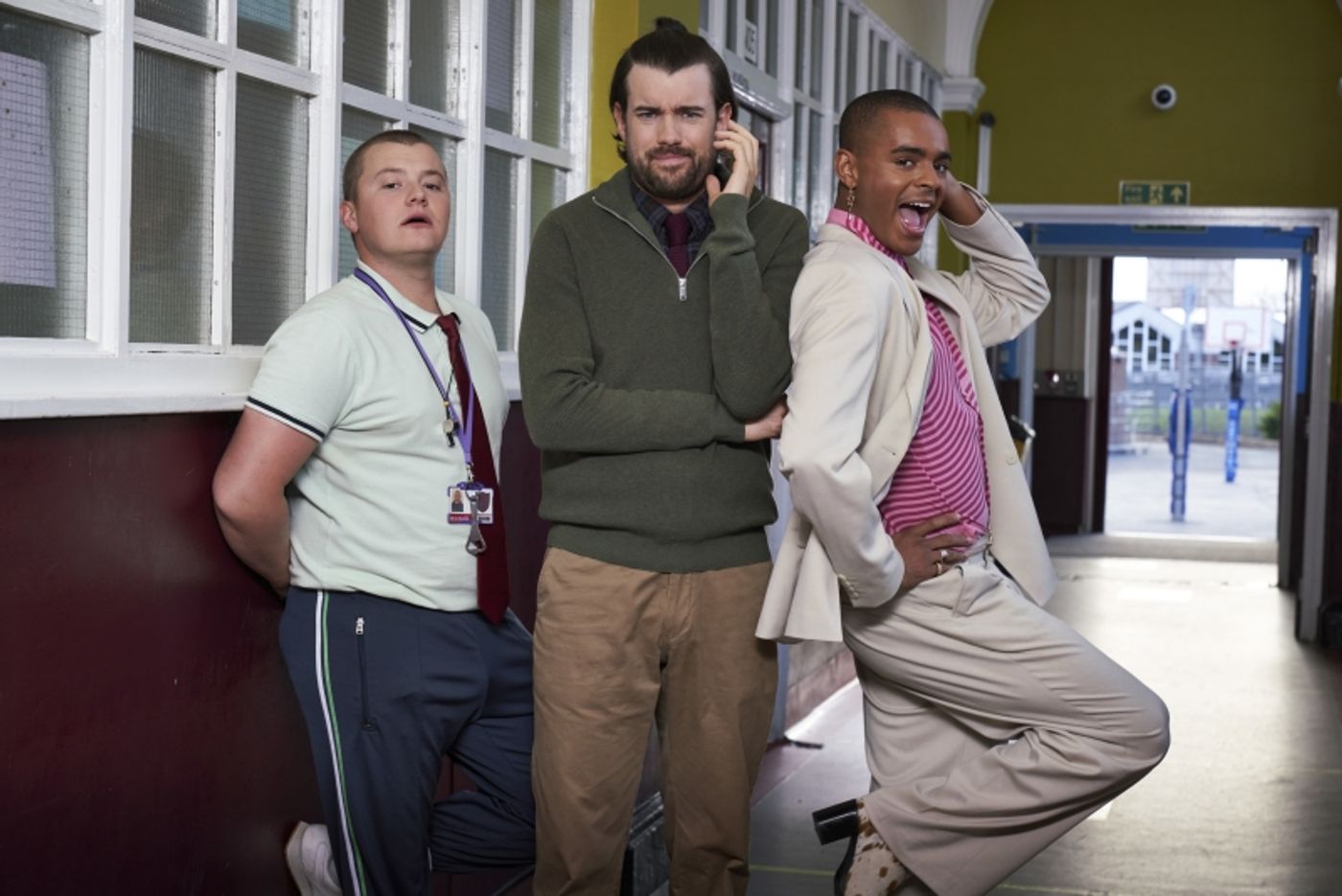
Credit: BBC / Tiger Aspect Productions
Photographer: Jack Barnes
Felix: [Imitating Jack Whitehall’s voice] You know, the way that he sings? [Returns to normal speaking voice] I could not wait to just put the whole song in that register, and then see what on earth happens. And so that was just tremendously fun. And then it was just a question of me sending Fred endless rubbish piano demos that are recorded on my phone, and then he'd come back going, “Yeah, that's really funny. Or . . .” There's one particular song that was a solo for Matt Horne, playing Fraser, that is, “Weren’t things much better in the old days of 2010?” And of course, then the whole point is, let's do a load of songs about things that are now very problematic. And of course, that becomes a very tiny tightrope to walk. How problematic do you go, for crying out loud? The world's a mess! So that was great fun, trying to find the line that would make the song funny, but also not bring down the BBC. [Laughs] It was enormous.
The other important thing with the creative process is that I've worked with the cast before, and that was a wonderful crash course in the “funny” that each cast member has, so I couldn't wait to get back in it. And so now when you're writing the song, you think, “Oh, that'd be a funny line for them, because they do that sort of thing really well,” or “Oh, they've got a really lovely falsetto, let's put a thing up there for them, and then make it funny like this.” Once you've gotten used to everyone's comedic sensibilities, their cupboard of tricks that they use to make things funny, then it becomes so enjoyable to write musical jokes for them.
So you mentioned a bit about on-screen versus on-stage. What is it like creating for an on-stage versus on-screen production?
Felix: Well, in my experience, in my role, it's a lot quicker doing it for screen. Again, I don't have a vast amount of experience writing musical theatre for telly - it's a few bits here and there. On stage, because you've got one viewpoint - the audience are looking at the stage. You're making that as visually and musically arresting as possible, and that takes an awful lot of rigour to calibrate and recalibrate, to make sure that you're putting all that energy in this One Direction out towards the audience.
But then on screen, because you have the unbelievable, vast cornucopia of options that having a camera that can move allows you, then you can put a lot more tiny little close moments into the music because you're able to zoom in and highlight with the camera. With the lens, it's a whole different ballgame and you have to give it over and trust the process of the directors and the camera people. So it's a vastly different thing. I found it's a lot more like making records to release because you're just trying to make the song as interesting as possible, and then everything else can be built on top of it rather than having to create this vast melange of different stuff.
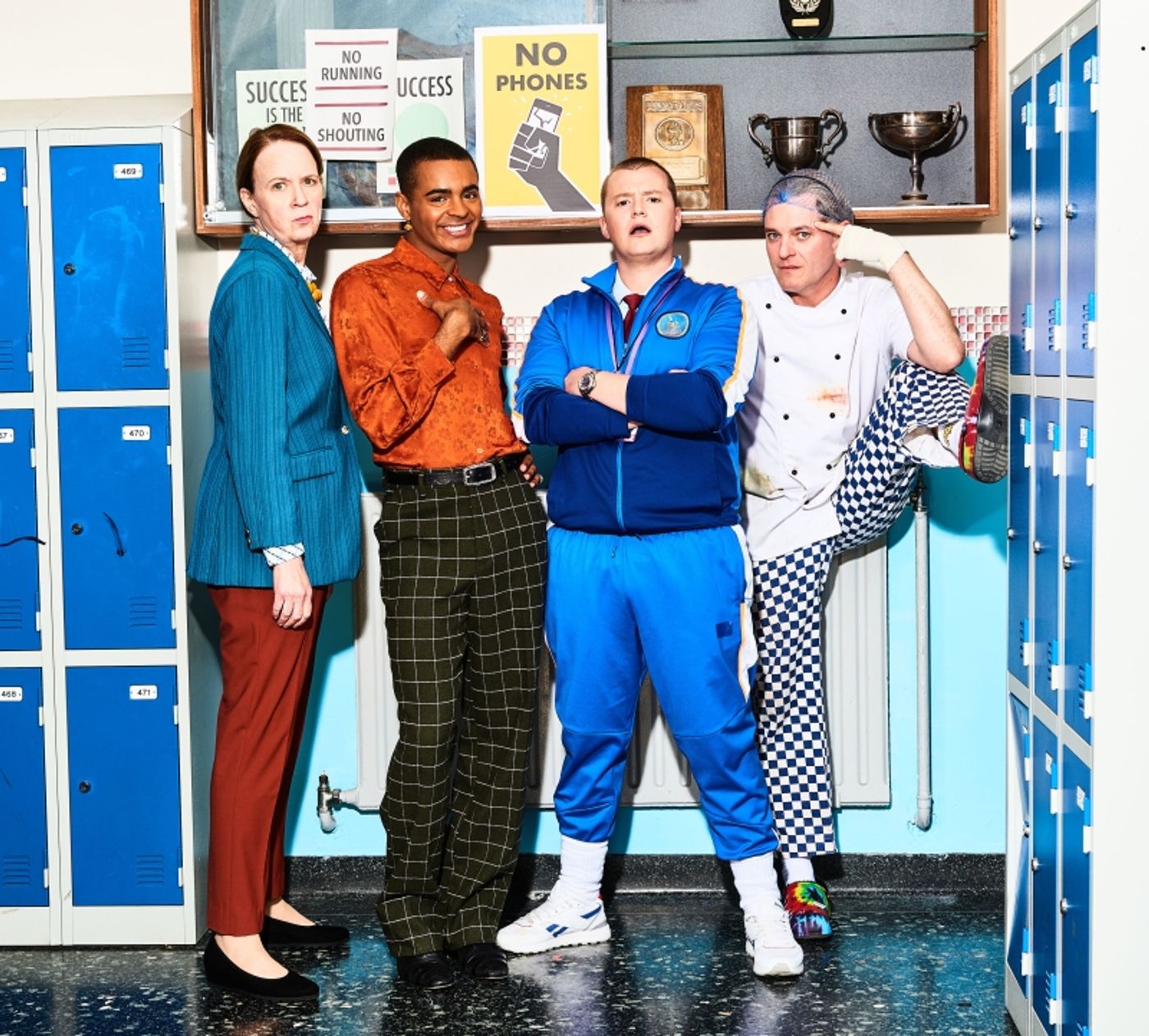
Shay: I can agree with Felix in so many ways. I'd say the first thing that's different is the time the length of time that you have to work on it. In comparison to a theatre context, usually there's way more discussion beforehand that turns into workshops. And then obviously, rehearsal period, tech . . . You've got all of this time from a micrographic perspective to take an idea and allow it to build and build. The TV aspect is much more succinct, straight to the point, and you need to get it on the money first time, which is great choreographic talent, but it's also just really nice to whack it out in what sometimes feels like the urgency and the timeframe of trying to create something for the TV world.
I also feel like when you do have the power of controlling what someone views, in terms of a TV perspective, for me, it makes me so much more aware that it's not all about the choreography. It's not all about that one element of like, okay, what can I bring? How amazing can I make it? How fun can it be? We really guide the audience - we tell them what they see. And in comparison to a filmed capacity, you don't really get to tell them what they see, you can tell different stories on stage in a proscenium space, and everyone could take something completely different as an audience member. They could take one story that you thought they were going to take or they could take a story that was completely different, that you maybe didn't even realise that you made. And I think that's kind of what is nice about the TV aspect is you really get to control and go, “We want you to see it like this. We want you to understand that like this. We want you to see the document like this.”
So they're both wonderful, beautiful ways of storytelling. But when I'm creating for theatre, I create this big overview so that no matter where you're sat in the auditorium, you can experience something that can hopefully help you understand the storytelling from what the music is doing, from how we're set up what stage, from how scenically we've just left the scene. That's my role - to help you wherever you're sitting to understand the story from the physical perspective. I guess that's the same thing in TV, but it's just so much more concise because there's one view, because the lens is guiding us. We really have to come together and know that the one thing that we're selling really works as a team. So that's my joy from working with cameras - I think it's a really, really great thing to do.
Do either of you have a preference for on-stage or on-screen?
Felix: In my experience of writing for stage, I've been involved in lots of other people's projects, but my chief experience has been my main show, Operation Mincemeat, and that was all-consuming. You do endless rewrites and it takes over your entire life completely. It's been the guiding North Star of my entire creative being for the past six and a half years. And then when it finally gets to fruition, when you finally get to the point where it's ready, and you put it in front of people and it's exactly the reaction that you want. It's live and it's spontaneous, and there's danger, and the end, that feeling of satisfaction is very, very profound. And also because you're in a space and you're sharing that experience with so many people, it's so tangible. And that is very moving for me.
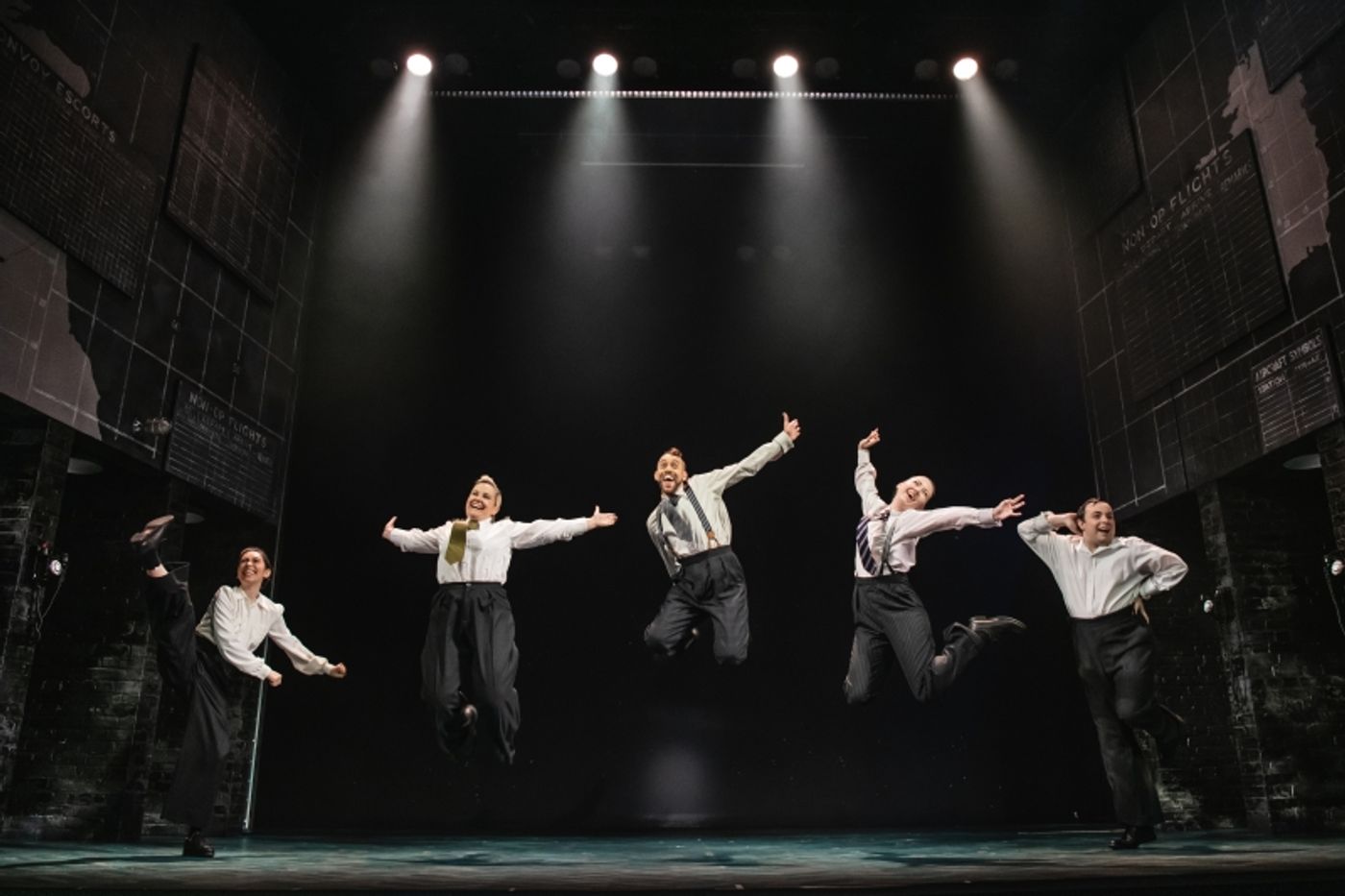
Photo Credit: Matt Crockett
But working on the telly, it's very joyful. There's far fewer colossal emotional breakdowns involved because it's quick and you've got all these different checks and balances, making sure that everything is ticking along, is moving along. You've got so many people who are immediately on it, giving reassurances, and you're building it towards a director's vision and having someone else really give such great pointers like Freddy does, that's very thrilling. So it's certainly easier and less stressful, and makes me go less bald and gray! I suppose they’re very different things, but very satisfying in their own way.
Shay: I couldn’t relate anymore to Felix's breakdown of theatre, of journey and process and how you spend all this time going, “Is this crazy idea in my brain actually right? Does it work? Is it telling the story? Are people enjoying it? Is it a moot point?” And then that moment where you actually sit amongst strangers that receive your work so well and cheer or stand, it's like no other feeling. But then at the same time, there's something really rewarding about watching something that you've devised on screen,
This is my first choreographic work that's actually on TV, so I don't know how I'm gonna feel! Maybe it will feel just as amazing. But there is something about that natural human aspect of being next to people in a space and enjoying a piece of theatre or taking a journey together. The reward of being in that space and seeing the work being enjoyed in that way is currently at the top. But who knows after Christmas? We could get to Christmas and I have this overwhelming feeling by myself on my cell phone that's way greater than being in an auditorium! [Laughs]
And finally, how would you describe the Christmas special of Bad Education in one word?
Shay: Rollercoaster - a rollercoaster of excitement!
Felix: I’m trying to find one word that combines all of these sentiments. It’s Bad Education through and through, but with some ridiculous Christmas magic that’s curdled - it’s joyful Christmas fare for weirdos.
Shay: British is what you said. British.
Bad Education: A Christmas Carol is currently on BBC iPlayer.
Videos

